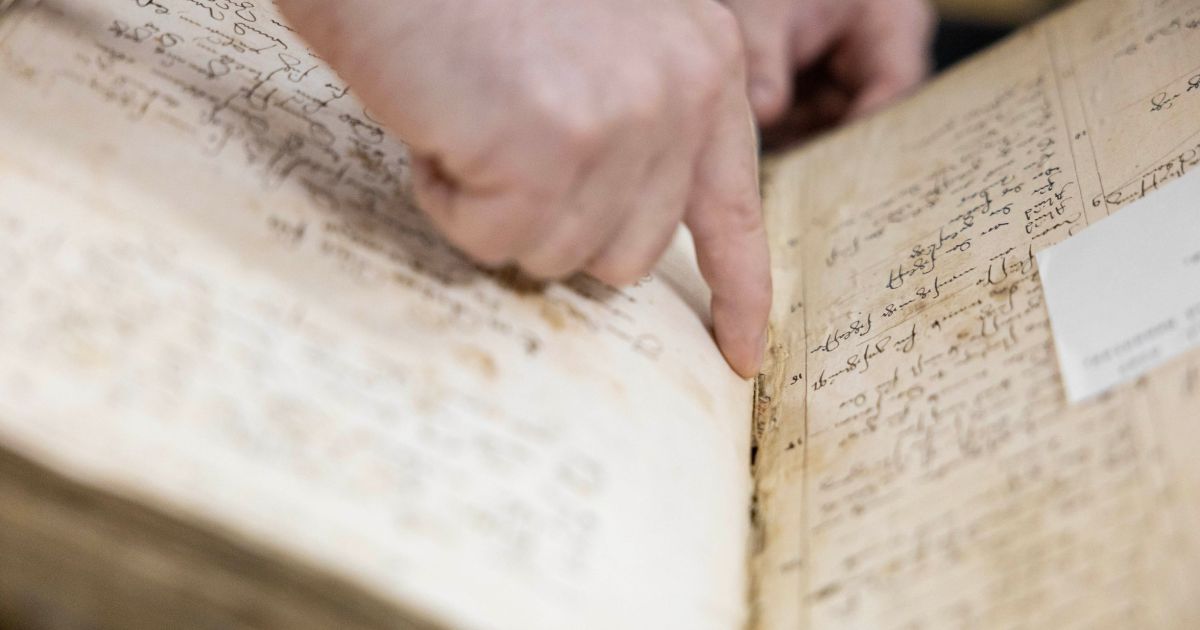Published
October 14, 2025
In the Mary Duke Biddle Room in the Rubenstein Rare Book & Manuscript Library, secured behind a 1,000-pound glass case where they’re protected from temperature and light variations sit two rare books valued at $1 million each.
You can “adopt” one for a fraction of that price.
Only 120 complete sets of “Birds of America” books by John James Audubon are known to still exist. Duke owns one set of the four volumes printed between 1827 and 1838, each book measuring more than 3 feet by 2 feet. The two on display showcase a vibrant, hand-painted drawing of a bird studied and sketched by the renowned ornithologist. On the first Friday of every month at 12:15 p.m., one page in each book is turned to reveal a new, bright depiction of a species, and the public is welcome to gather and witness the ritual as it comes to life.
But the bindings on three of the four volumes are fraying.
Repairing them will be costly – probably more than $30,000 each. They have appeared in Duke University Libraries’ Adopt-a-Book Program since the program began in 2013, but so far, no one has stepped forward yet to sponsor their care and fund the essential repairs.
“If you’ve got something that valuable where the boards are coming off and the spine’s coming off, it just feels like you should get it fixed and take care of it,” said Beth Doyle, Head of Duke University Libraries’ Conservation Services Department.
So, it remains on the list, waiting for a benevolent adopter.
In the 12 years since Doyle started Duke Libraries’ Adopt-a-Book Program, more than 200 books have been “adopted,” raising about $150,000 to restore rare books or other treasures in the Libraries’ collection, or to purchase conservation supplies beyond the operating budget.
They’ve been adopted by fellow Libraries staff members, Duke employees, alums and just fans of the library. Books range from $25 to that $30,000 price tag, and each comes with an electronic book plate listing the adopter in the item’s catalogue record. An exhibit about the program is on display through Feb. 6 in the Rubenstein Library.
“We’ve had some amazing things be adopted through the program,” Doyle said. “It’s pretty cool because now that thing is repaired and can be made available for a very long time.”
Video by Travis Stanley
Where the magic happens
In the basement of Perkins Library, Rachel Penniman and Henry Hebert are on the Libraries team tasked with bringing damaged library items back to life. Hebert, a Conservator for Special Collections, and Penniman, a Conservation Specialist, work with Senior Conservator for Special Collections Erin Hammeke and Doyle to make repairs and enclosures for anything in the collection that has begun to degrade. The value of their work is highlighted in October, American Archives Month.
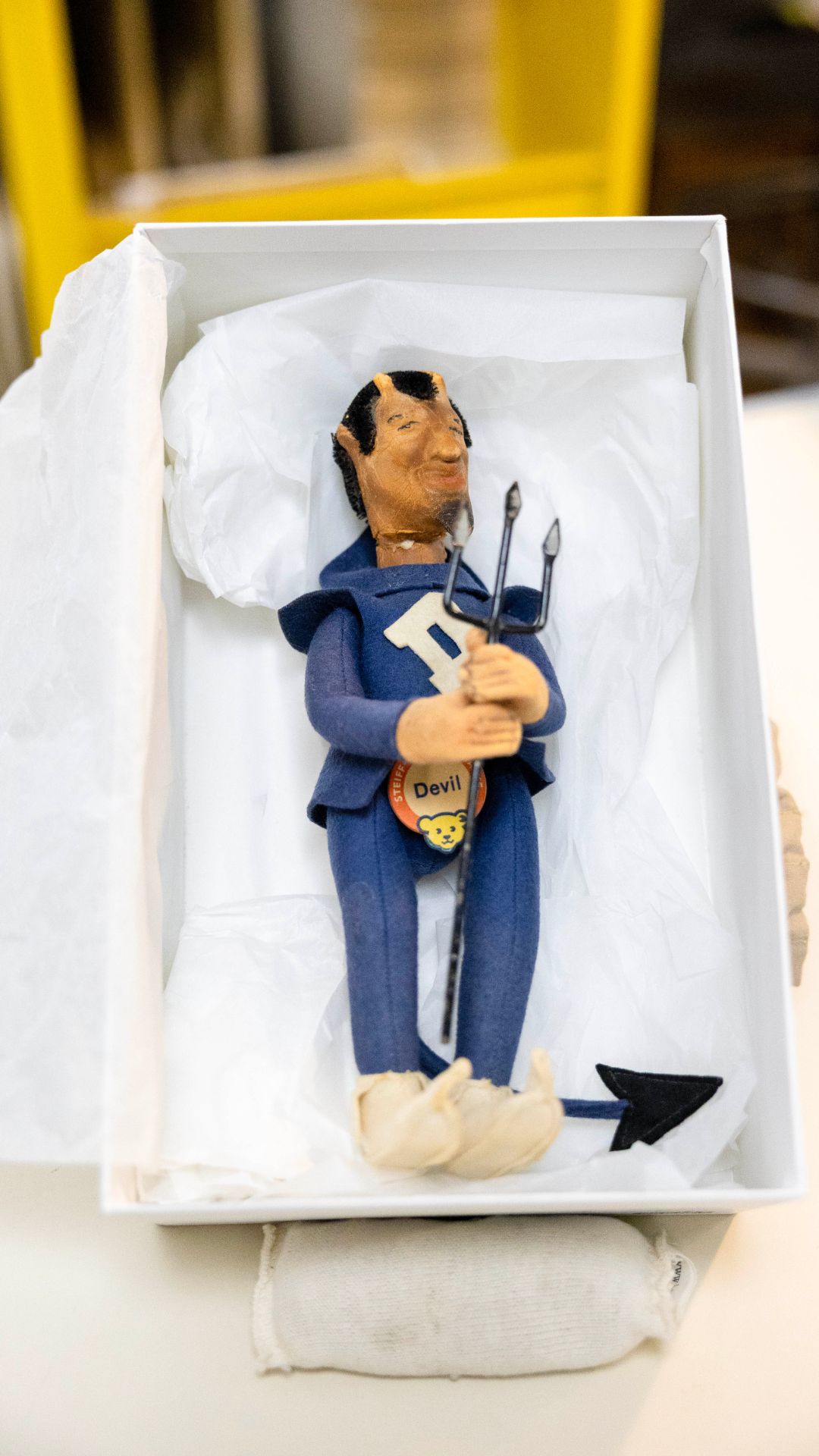 A Blue Devil doll from the 1930s needs a better enclosure than the shoebox it arrived in, and will be available in the Adopt-a-Book program. Photo by Travis Stanley
A Blue Devil doll from the 1930s needs a better enclosure than the shoebox it arrived in, and will be available in the Adopt-a-Book program. Photo by Travis Stanley
“A lot of what we do is trying to keep things as good as we can for as long as we can,” Penniman said.
They have specialized knowledge of how to wash paper in books, how to repair bindings that are hundreds of years old and how to find unique tools that will help them make tiny fixes.
Penniman has repurposed old dental tools for their delicate precision and recently bought a heating pad made for reptile enclosures when she needed a large, heated surface where she could perform mends. The conservation supplier charged hundreds for a similar product that she duplicated in a $20 creative Amazon order.
“Because conservation is such a small field, we poach tools and supplies from other larger disciplines,” Penniman said. “I’m always ordering stuff online.”
Most recently, Penniman repaired the delicate silk hinge threads binding a photo album from the Mary Duke Biddle Trent Semans family papers, and Hebert restored a German physician’s handwritten book from the 1630s that had been patched overzealously with tape in the 1970s. Tape is the enemy of conservators.
“It doesn’t stay on the way you want it to, and then it’s a pain to take off,” Hebert said. “It takes a tremendous amount of time to remove it.”
A new item recently arrived in Special Collections in a shoe box: a Blue Devil doll from the 1930s made by Steiff, a renowned toy manufacturer of Teddy bears. A twin to the new Blue Devil is already in the collection, but is so damaged that its wax face is melted to distortion. The newer Blue Devil is unblemished.
“We appreciate that they put him in a box to take care of him, but we can’t leave him in a shoe box,” Penniman said. “We need to put him in something longer lasting.”
The Blue Devil doll is expected to be available for adoption on the Adopt-a-Book page soon to fund his new, permanent enclosure home.
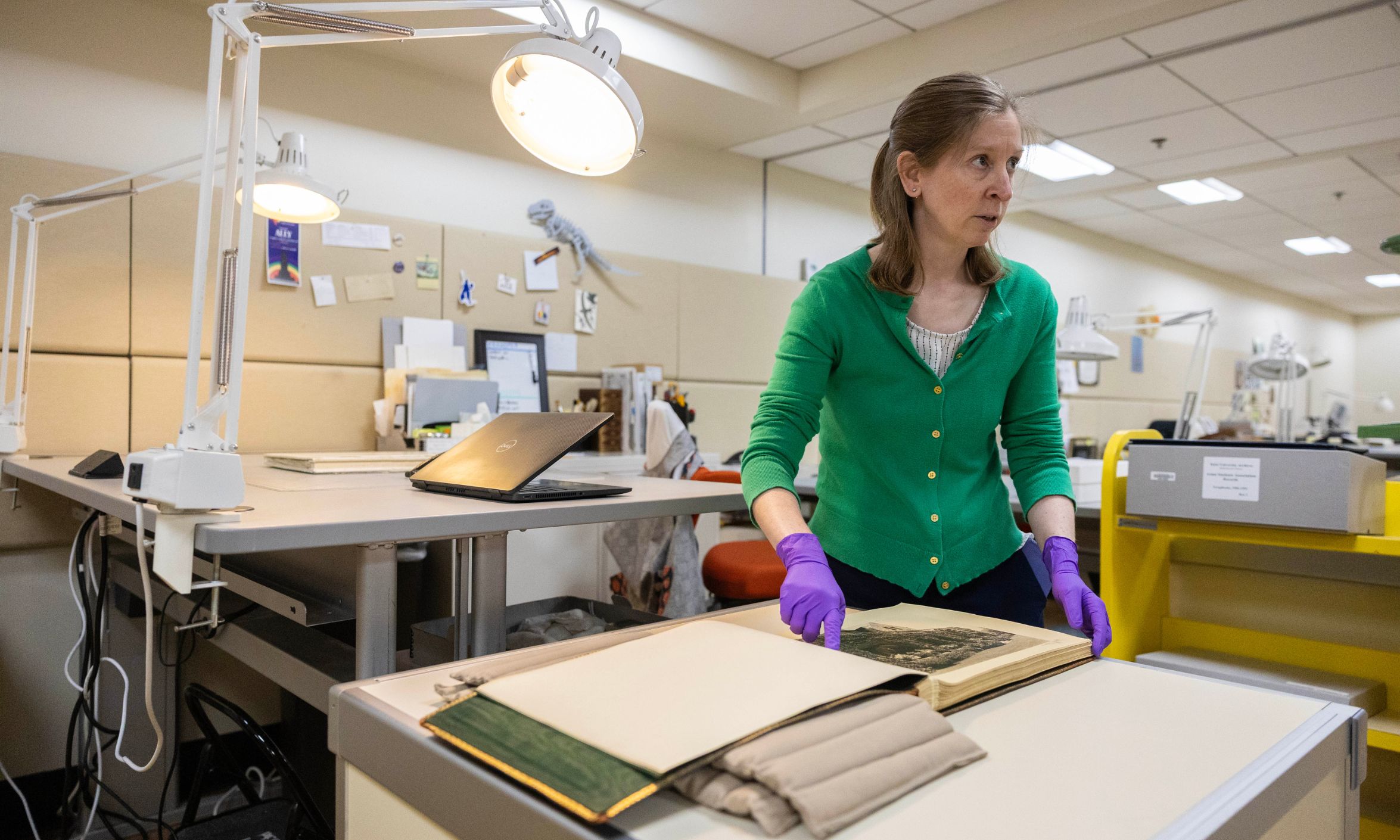 Rachel Penniman shows off repairs she made to the binding on a photo album from the Mary Duke Biddle Trent Semans family papers. Photo by Travis Stanley
Rachel Penniman shows off repairs she made to the binding on a photo album from the Mary Duke Biddle Trent Semans family papers. Photo by Travis Stanley
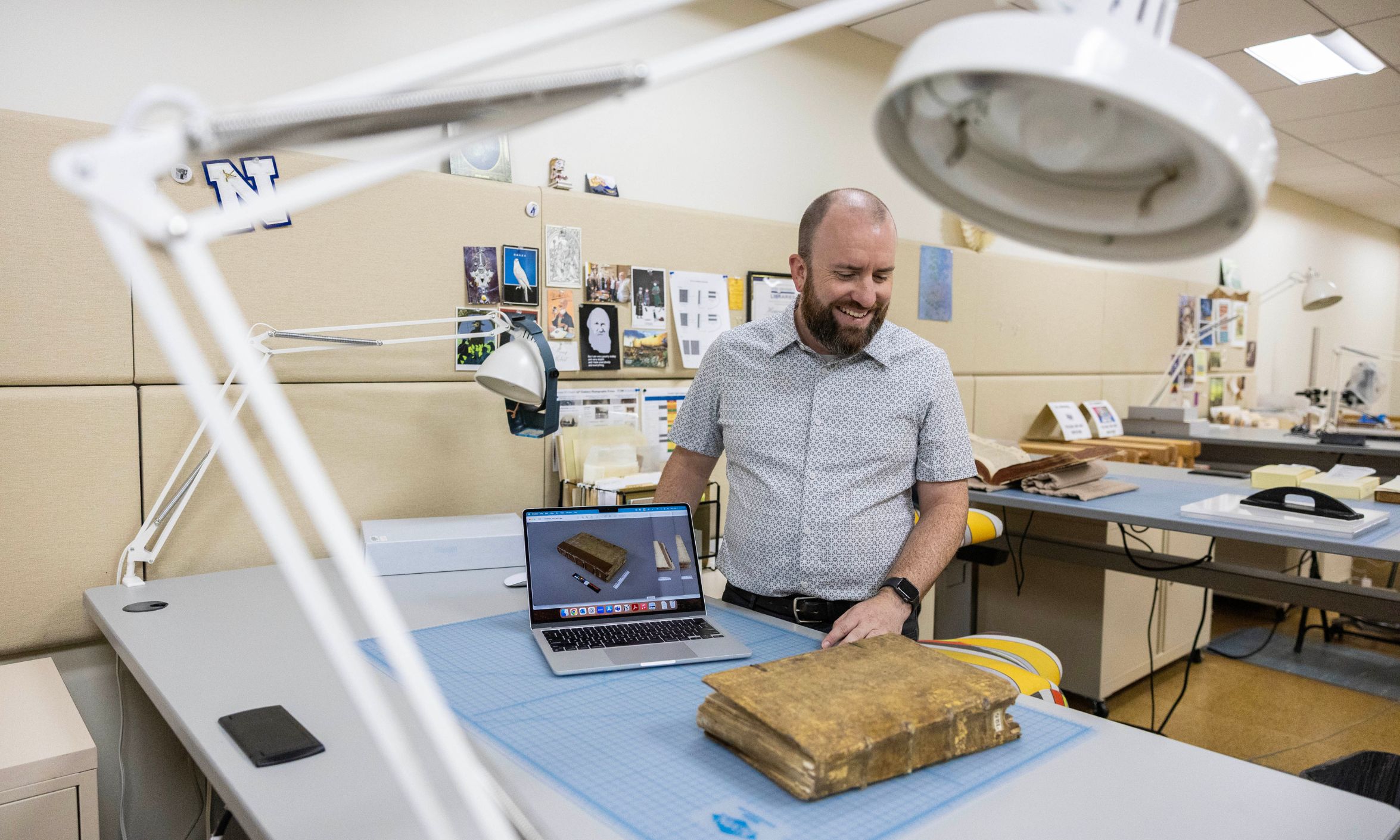 Henry Hebert works on a German physician’s book from 1630. Photo by Travis Stanley
Henry Hebert works on a German physician’s book from 1630. Photo by Travis Stanley
The gift for someone who has everything
Dracine Hodges has had her eye on “The Illustrated Language of Flowers.” The “very small and fragile” book was published in 1862 and includes colorful images and text that needs a new custom enclosure to protect it. Hodges, Associate University Librarian, is astonished that no one has yet adopted the little flower book available for $50.
“I need to adopt it,” she said.
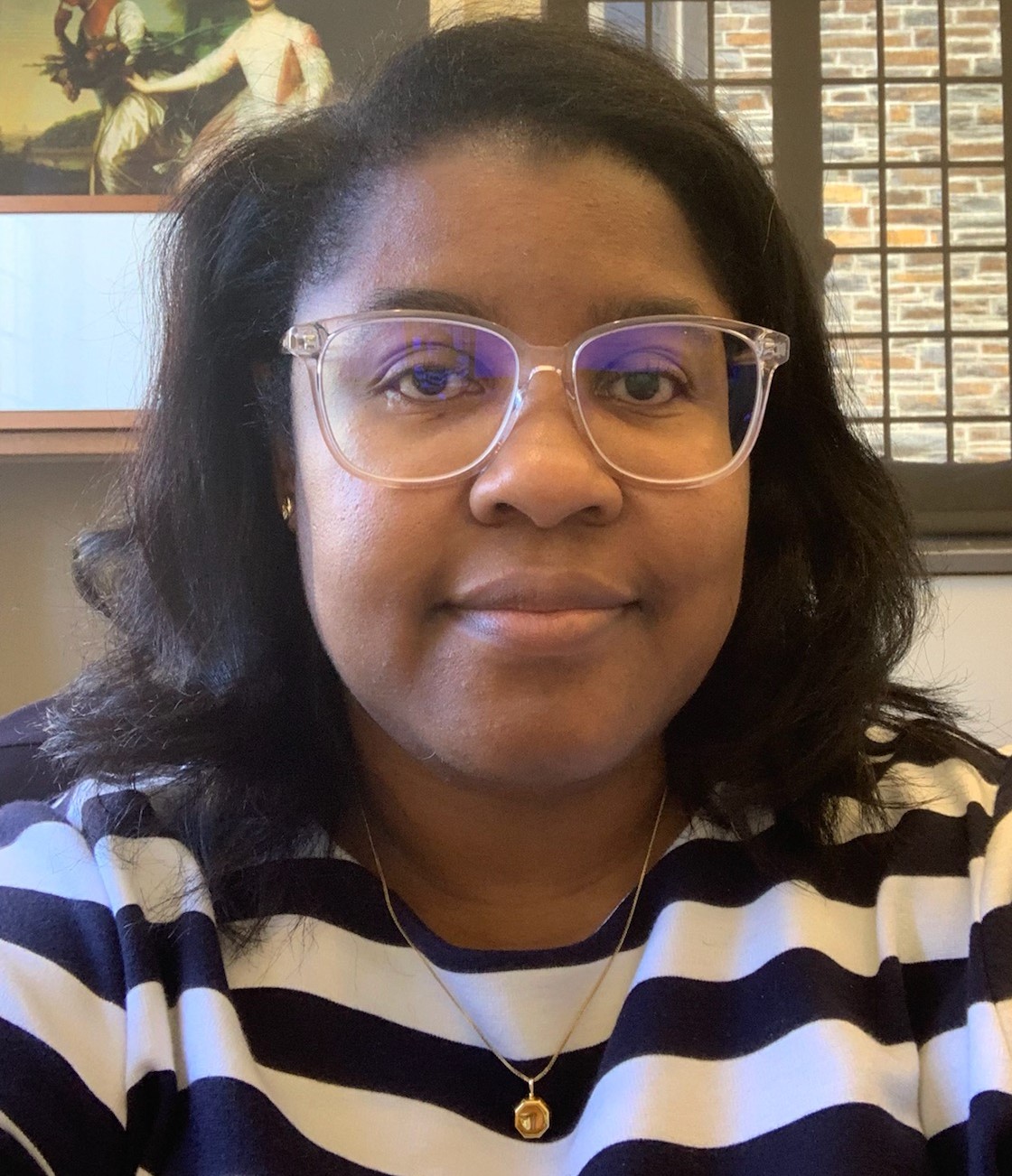 Dracine Hodges
Dracine Hodges
Hodges has already adopted four books through the Adopt-a-Book Program: Two novels by African American science fiction author Octavia Butler in memory of former Duke colleague Sara Seten Berghausen, a set of volumes originally bound by a pioneering female book binder, more Octavia Butler books for herself, and a 1965 copy of “Dune.”
“I think I had just watched the movie and was getting into it, so I said, ‘Oh, this is cool,’” Hodges said.
“Adopting” a book helps it live on by supporting the library and also “marks it as a thing that meant something to you,” Hodges said.
In that way, it can be a gift for that person who has everything. It’s often provided as a Duke retirement gift by colleagues, Hodges said, or made in a loved one’s memory.
“It shows that this is important or has been impactful to the reader or the person who’s being honored,” Hodges said.
Doyle rotates a variety of books and items at a range of price points on the Adopt-a-Book website, and also takes special requests from the millions of books and items housed and cared for by Duke Libraries. The adoption options are plentiful – including those Audubon books that are still available.
“It makes me very happy to be able to showcase some of this work and make connections with people who love the library as much as I do,” Doyle said.
Send story ideas, shout-outs and photographs through our story idea form or write working@duke.edu.
Follow Working@Duke on X (Twitter), Facebook and Instagram and subscribe on YouTube.

